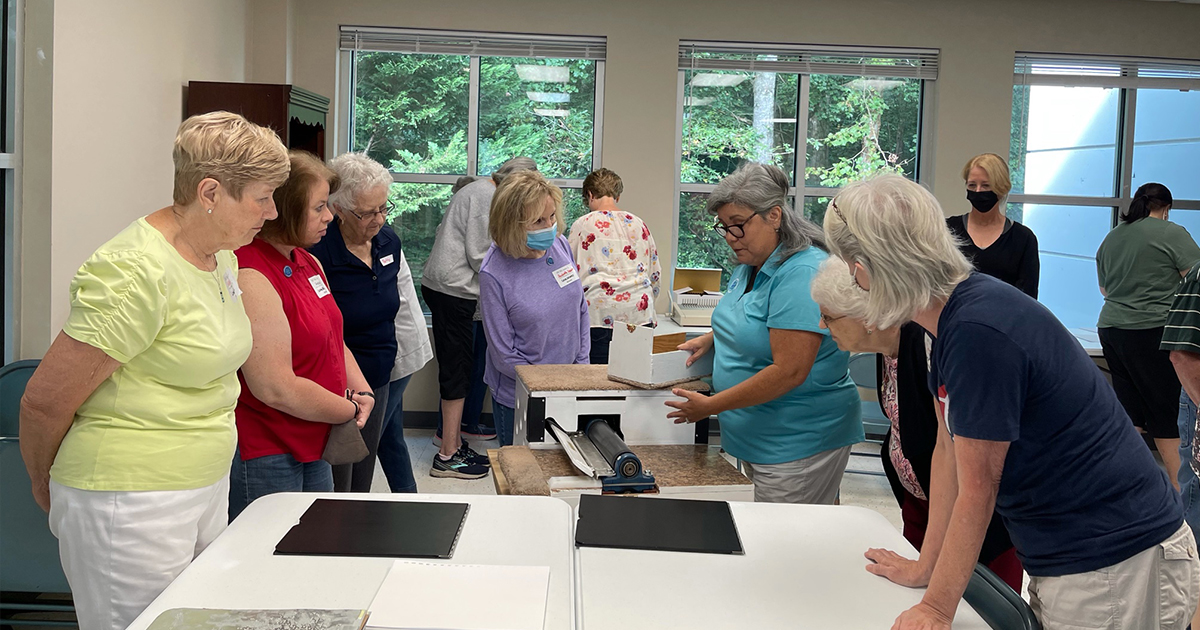
By Cheryl Magness
On Sept. 17, Lutheran Braille Workers (LBW), a Recognized Service Organization of The Lutheran Church—Missouri Synod (LCMS), opened a new ministry production center at Rivercliff Lutheran Church in Sandy Springs, Ga. The new center brings the total number of LBW production centers to 114.
The Rev. Jeff Jordan, Rivercliff’s pastor, described the Rivercliff location’s first day of operation.
“As I walked into the room after it all started,” Jordan said, “it was complete chaos, and it was the most wonderful thing I had ever seen in my life. To see these people excited about punching holes in paper and hitting buttons … and making Braille … the joy was incredible.”
According to its website, LBW began in 1943 when Helene Loewe Koehler, a member of Trinity Lutheran Church in Whittier, Calif., heard about a blind pastor in Germany who needed a Braille Bible. Koehler learned Braille and then spent months manually producing a German Braille Bible, one dot at a time. After the Bible was shipped to its recipient, she received a letter thanking her for the Bible and asking, “How many more can you send?”
From there, LBW grew from Koehler’s home to the basement of Trinity to an ever-expanding network of Lutheran churches and volunteers. Almost 80 years later, the organization — now based in Yucaipa, Calif. — is the world’s largest non-profit producer of Braille, specialized large print, and audio Christian materials, having shipped more than 14 million Bibles and millions of other materials, in almost 40 languages, free of charge to 164 countries. Julie Zemke, LBW’s director of marketing and outreach, estimated that there are around 3,000 active LBW volunteers around the country.
LBW materials are produced on demand when an order is placed. Volunteers learn how to operate a Braille press, collate pages and assemble them into a book. The final product is shipped directly from the production center. “When that recipient opens that book,” Zemke said, “that recipient knows that someone … cared enough to make that book and sign their initials.”
Asked what it takes to start a production center, Zemke said, “Congregational support. We do ask that the church support the ministry by purchasing supplies needed to produce materials, by providing volunteers and, of course, by praying. It’s also important to have a local individual who is willing to serve as a liaison between the congregation and the national office. And it helps if he or she is passionate about this ministry.”
Arla Richter is such a person. Richter, a member of St. Paul Lutheran Church in Fort Worth, Texas, has been volunteering for LBW for the last 40 years. St. Paul’s has an active LBW production center that has 10 to 12 different groups volunteering on a rotating basis.
“We have some retired people but also a lot of high school and college students who volunteer, including some sororities that come in from Texas Christian University in Fort Worth and University of North Texas in Denton,” Richter said. Most groups spend a couple of hours at a time working in St. Paul’s dedicated space on the church’s campus.
“The building we work in used to be an apartment building. The church bought it for office space, and we asked if we could have one of the apartments for a production center. It’s wonderful because we are able to leave the equipment set up at all times for the groups that are constantly coming in. We use the downstairs for production and the upstairs for shipping,” Richter said.
St. Paul’s production center has been operating for a little over a decade, but Richter has been volunteering for LBW much longer. Asked why she continues to do so, she replied, “Every one of us volunteers is blessed. We know that, for every book, there’s a person waiting on the other end. Each little group [of volunteers] forms a special bond while they work. Sometimes what happens with the people [at an LBW center] is just as important as what happens with the production. Anybody who can get involved in this work is just blessed.”
According to Zemke, there are 253 million blind people in the world, 241 million of whom are unchurched. It is not necessary to have a dedicated space or a large group to get involved in LBW. “We can work with any number of people and any space,” Zemke said.
Wayne Smith, a volunteer at the newly opened Rivercliff production center, said, “There are a lot of people that want to be able to share the Bible, and this is such a great, concrete way to do it. At the end of the day, you can hold up the Bible and say, ‘I did this and it’s going to somebody that I know really wants to hear the Word.’”
Learn more about Lutheran Braille Workers.
Posted Nov. 16, 2021




